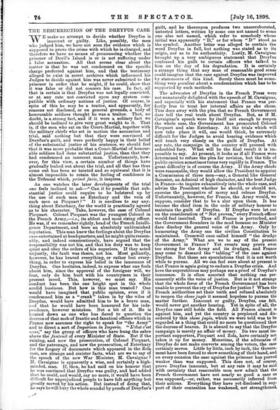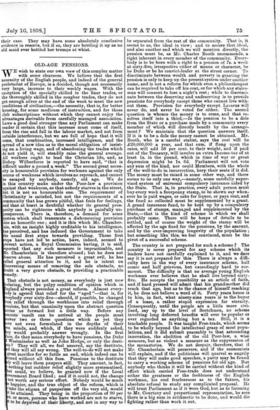THE RESURRECTION OF THE DREYFUS CASE.
WE make no attempt to decide whether Dreyfus is innocent or guilty. Like, possibly, the men who judged him, we have not seen the evidence which is supposed to prove the crime with which he is charged, and therefore we have no means of pronouncing whether the prisoner of Devil's Island is or is not suffering under a false accusation. All that seems clear about the matter is that he was not condemned on the specific charge preferred against him, and that the testimony alleged to exist in secret archives which influenced his Judges to decide against him was never submitted to the prisoner in order that he might, if he could, show that it was false or did not concern his case. In fact, all that is certain is that Dreyfus was not legally convicted, or at any rate not convicted upon any system com- patible with ordinary notions of justice. Of course, in spite of this he may be a traitor, and apparently, for reasons not disclosed, or on general grounds, a body of honourable soldiers thought he was a traitor. That, no doubt, is a strong fact, and if it were a solitary fact we should be inclined to give very great weight to it. That is, if the men who sat on the Court-Martial, together with the military chiefs who set in motion the accusation and trial, said nothing but that they were convinced of Drevfus's guilt, and were perfectly happy in their belief of the substantial justice of his sentence, we should feel that it was more probable that a Court-Martial of honour- able soldiers had done substantial justice, than that they had condemned an innocent man. Unfortunately, how- ever, for this view, a certain number of things have gradually leaked out about the trial, and all that has thus come out has been so tainted and so equivocal that it is almost impossible to retain the feeling of confidence in the Tribunal which, primd facie, it inspires.
As one watches the later developments of the trial one feels inclined to ask—" Can it be possible that sub- stantial justice could require to be bolstered up by the use of such men as Esterhazy and the ruin of such men as Picquart ? " It is needless to say any- thing about Esterhazy, for the world is practically agreed as to his character. Take, however, the case of Colonel Picquart. Colonel Picquart was the youngest Colonel in the French Army,—i.e., its ablest and most rising officer. He was, if we remember rightly, head of the French Intelli- gence Department, and bore an absolutely unblemished reputation. This man knew the feelings about the Dreyfus case entertained at headquarters, and he might quite reason- ably, and indeed conscientiously, have argued that the responsibility was not his, and that his duty was to keep quiet and obey the orders of his superiors. If they acted unjustly, the fault was theirs, not his. Most gallantly, however, he has braved everything, or rather lost every- thing, in order to express his belief in the innocence of Dreyfus. One hesitates, indeed, to express what one feels about him, since the approval of the foreigner will, we fear, only do him hurt with his countrymen in their present mood. This, however, we must say. His conduct has been the one bright spot in the whole sordid business. But how is this man treated ? One would have imagined that public opinion, even if it condemned him as a " crank ' taken in by the wiles of Dreyfus, would have admitted him to be a brave man, and that he would have been honoured for his inde- pendence, however mistaken. Not a bit of it. He is hunted down as one who has dared to question the decrees of that mob of frantic and fanatical officers which in France now assumes the right to speak for "the Army" and to direct a sort of Imperiwm in Imperio. "L'dtat c'est nous," say the group of officers who have hung the sabre above the fauteuil of every Minister of State. But if the ruining, and now the prosecution, of Colonel Picquart, and the patronage, and now the prosecution, of Esterhazy for the forgery of documents which appeared in the Zola case, are strange and sinister facts, what are we to say of the speech of the new War Minister, M. Cavaignac ? M. Cavaignac is apparently a wise, and certainly a high- minded, man. If, then, he had said on his honour that he was convinced that Dreyfus was guilty, and had added that he could, and would, say no more, it would have been difficult for unprejudiced people to have felt anything but greatly moved by his action. But instead of doing that, he says he will bury the whole scandal by proofs of Dreyfus's guilt, and he thereupon produces two uncorroborated, untested letters, written by some one not named to some one also not named, which refer to somebody whose initial was apparently " D," or for whom "D" stood as the symbol. Another letter was alleged to contain the word Dreyfus in full, but nothing was stated as to its origin, nor as to its authenticity. Lastly, M. Cavaignac brought up a very ambiguous statement that Dreyfus confessed his guilt to certain officers who talked to him on the day of his degradation. It is certainly a strange thing that any man of reasonable good sense could imagine that the case against Dreyfus was improved by statements of this kind. Surely there must be some- thing very peculiar about a condemnation which has to be supported by such methods.
The advocates of Dreyfus in the French Press were not unnaturally delighted with the speech of M. Cavaignac, and especially with his statement that France was per- fectly free to treat her internal affairs as she chose. This does away with the plea that no French Government dare tell the real truth about Dreyfus. But, as if M. Cavaignac's speech were by itself not enough to reopen the whole case, the Government has prosecuted Colonel Picquart and also Esterhazy. At the trials which will now take place it will, one would think, be extremely difficult for the Judges to avoid hearing evidence which will touch very closely on the guilt of Dreyfus. At any rate, the campaign in the country will proceed with redoubled fury. What will be the final result it is im- possible to say. At present, it looks as if all France were determined to refuse the plea for revision, but the tide of public opinion sometimes turns very rapidly in France. The great difficulty is of course the Army. If the Army chiefs were reasonable, they would allow the President to appoint a Commission of three men—say, a General like General Saussier, an Admiral of high character, and the best Judge in France—to inquire exhaustively into the whole case, and advise the President whether he should, or should not, exercise the prerogative of mercy and release Dreyfus. Unfortunately, however, for France, the Army would, we suppose, consider that to be a slur upon them. It has become the chief item in the code of military honour to maintain the guilt of Dreyfus. If Dreyfus were let out on the consideration of " Not proven," every French officer would feel insulted. Thus all France is perturbed, and the Government flounders in the mud because no Minister dare disobey the general voice of the Army. Only by humouring the Army can the civilian Constitution be maintained. Cromwell once called himself " the drudge of the Army." What are we to say of the present Government in France ? Yet events may prove even too strong for the Army and its drudges, and France may come to demand the " tabling" of the case against Dreyfus. But these are speculations that it is not worth while to pursue. All we can feel sure about at present is that France is again going to endure a Dreyfus crisis. And here the superstitious may perhaps see a proof of Dreyfus's innocence. It is often asserted that nothing can per- manently stifle the voice of justice. But is it not strange that the whole force of the French Government has been unable to prevent the cry of Dreyfus for justice ? When the French .authorities set their teeth and refused absolutely to reopen the chose juge'e it seemed hopeless to pursue the matter further. Innocent or guilty, Dreyfus, one felt, would never get another hearing. Yet in spite of all, the Dreyfus case still hoids the field. All France almost is against him, and yet the country is perplexed and dis- ordered by this chose jugge, which we were told was to be regarded as a thing that could no more be questioned than the decrees of heaven. It is absurd to say that the Dreyfus campaign is merely an affair of money. Its two most im- portant supporters, Picquart and Zola, have certainly not taken it up for money. Meantime, if the advocates of Dreyfus do not make converts among the voters, the case certainly moves. Little by little, inch by inch, the Govern- ment have been forced to show something of their hand, and on every occasion the case against the prisoner has proved weaker than was supposed. This does not, of course, prove Dreyfus innocent, but at any rate it may be said with certainty that reasonable men now admit that the French Government have not nearly so good a case as was supposed,—or, rather, was necessarily inferred from their actions. Everything they have yet disclosed in sup- port of their contention has weakened, not strengthened, their case. They may have some absolutely conclusive evidence in reserve, but if so, they are bottling it up as no old maid ever bottled her trumps at whist.



































 Previous page
Previous page